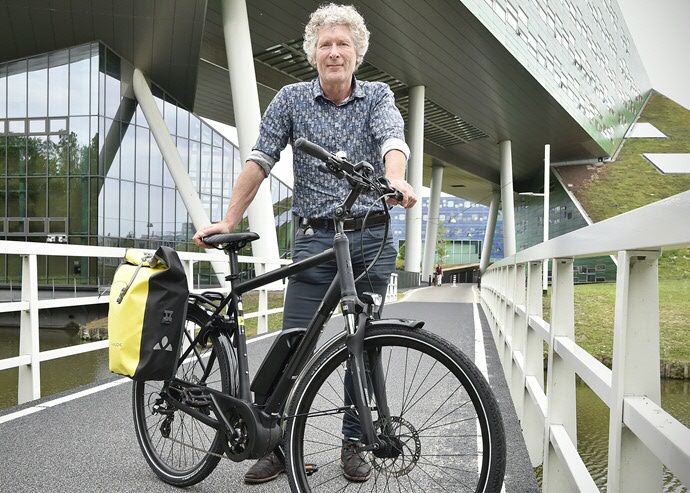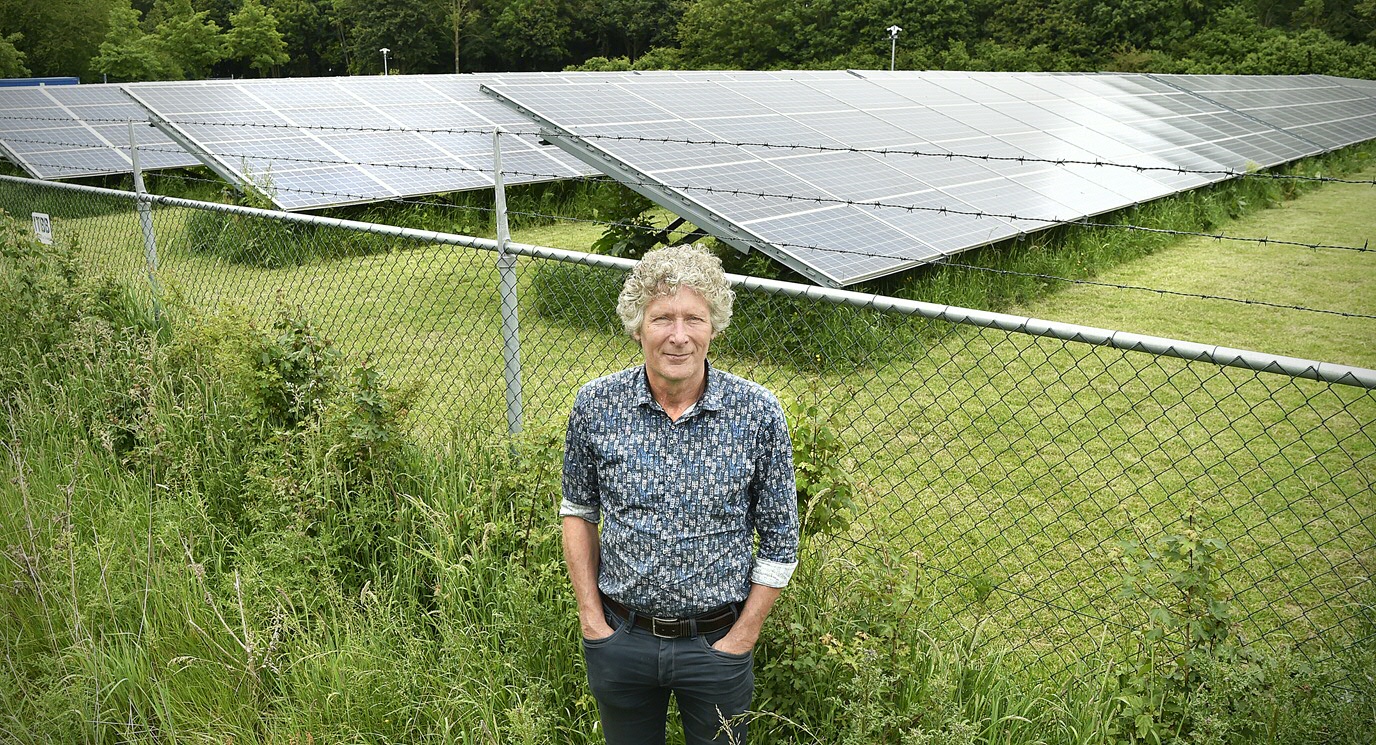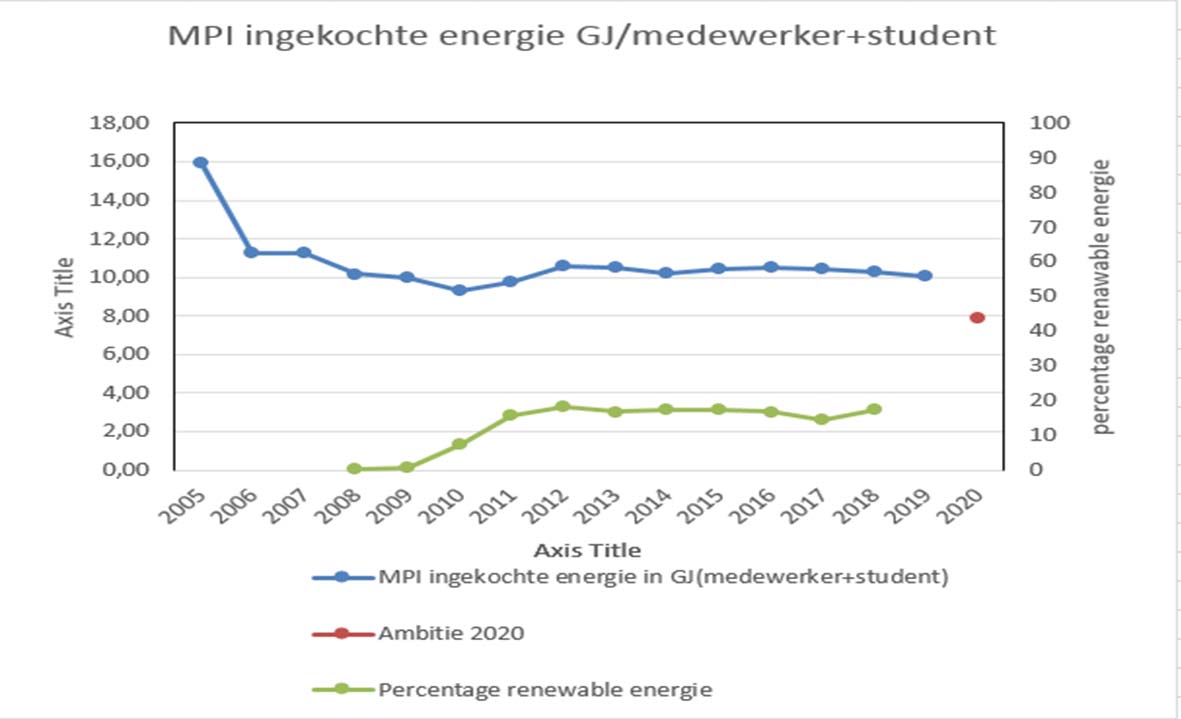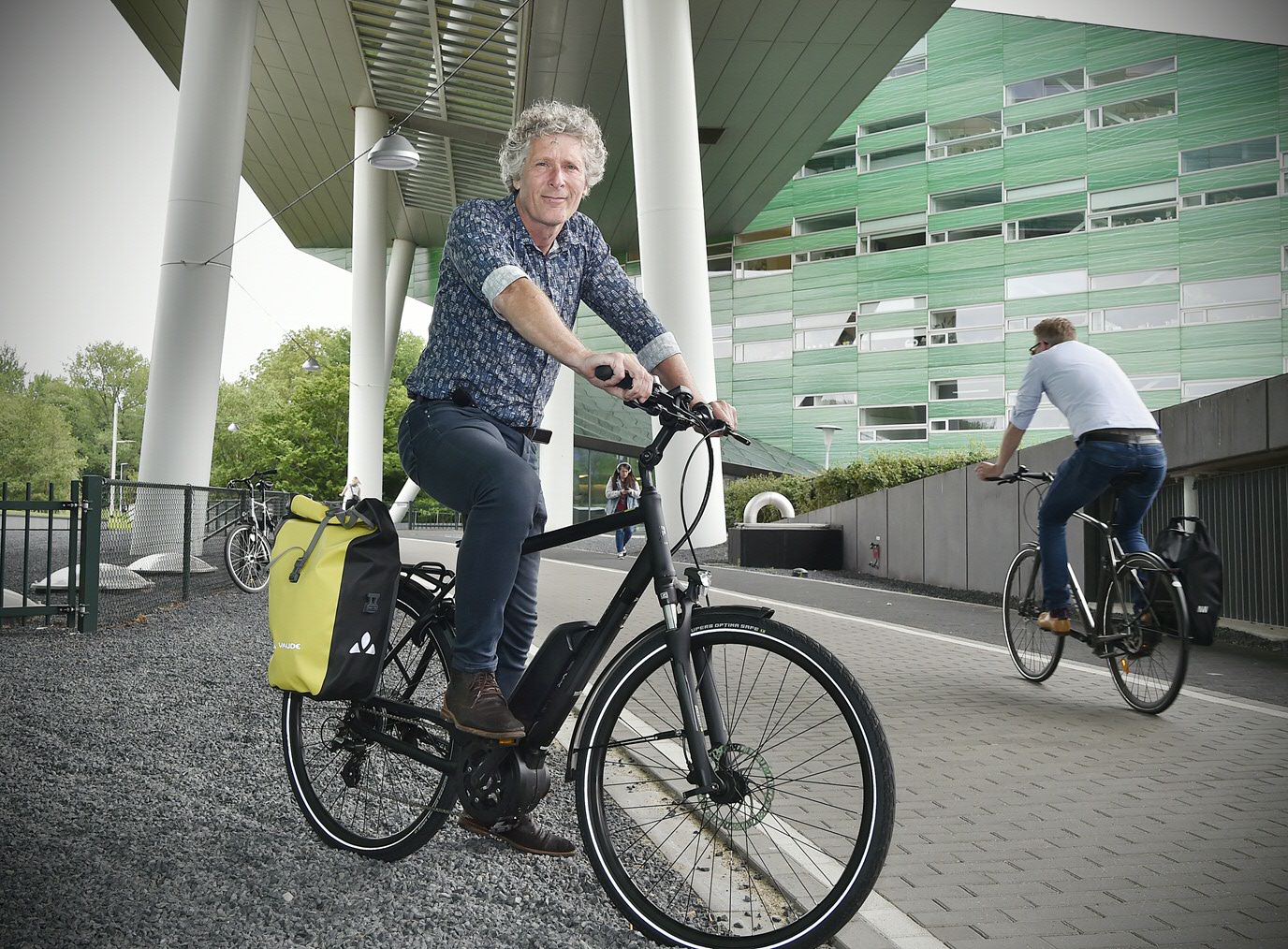Full speed ahead towards a green university

Dick Jager isn’t one to give up easily. Since the late 1990s, he has been working to make the University of Groningen more sustainable. His journey has been a struggle, with the road often peppered with obstacles. But now things are going his way. Sustainability is a high priority in the University’s vision and new strategic plan for 2020. He’s gone from flogging a dead horse to racing ahead on a super-fast e-bike.
Text: Riepko Buikema, pictures: Elmer Spaargaren
‘Would you like to try it?’ He doesn’t wait for an answer. Dick Jager is off to the bicycle cellar of the Health, Safety and Sustainability department on the Visserstraat. ‘Come on!’ We go past a moss-covered wall with strict video messages: Remember to turn off your computer before leaving. This is the green heart of the University of Groningen, where Jager is a tireless ambassador. Before I have time to blink, I’m travelling at breakneck speed through the Hoekstraat on Jager’s brand new, souped-up e-bike. ‘It's going fast, isn't it? I still have to buy a helmet.’
Life lesson
It seems that over the past 45 minutes, I have unwittingly passed Jager’s test. ‘I’ve learned to put my energy into colleagues who believe in sustainability. I used to think: I have to convince the climate-change sceptics, things have to change. But there’s no point. All that does is create frustration. Now I help the people who want to see change, or who want to take that extra step to live more sustainably. It gives better results. But that’s something I’ve had to learn.’
The tide has turned
Jager has seen the UG community make that change. He regards this as the Green Office’s greatest achievement. ‘At the University, I initially felt that we were flogging a dead horse. Five or six years ago, people’s first reaction was: “who are you? Oh no, not sustainability! That’ll mean making an effort, I’m already so busy and it’ll cost money...” But that’s really changed. Staff have realized the importance of sustainability. When we visit the faculties or service units, they now say: “We’ll help you with the green agenda, it’s something we need to work on.” If we hadn’t started the Sustainability Roadmap 2015-2020, we wouldn’t have got this far. That’s the Green Office’s biggest achievement. We are on the map. That’s what I’m most proud of.’

Team player
Writing an article that revolves around Dick Jager isn’t always easy. During our interview, he repeatedly attributes the merits of his sustainability offensive to the fruitful cooperation with countless colleagues, all of whom he mentions by name. ‘We have a good team. The momentum has really got going.’
This combination of forces strengthens his position. ‘For example, we were asked to give an opinion on the new coffee machines before tenders were called. Soon, we’ll go from sustainable coffee to coffee that’s also fairtrade and organic. That’s a good step forward.’ But the fully electric or hydrogen car provided for members of the Board of the University didn’t go ahead despite recommendations, which included a business plan. ‘The Board wasn’t ready for it. But Jouke de Vries said that they will definitely look at getting a sustainable car in two years’ time. I really see this as a win. And we have to communicate that. Everyone needs to know what our recommendations are, what course of action the Board chooses and what the ultimate outcome is.’
The hard facts
The news about outcomes isn’t always good. Not everything is a success, says Jager. A critical look at the goals that were set five years ago shows that there is still no room for complacency. ‘We appraised all the figures with someone from Accounting. It turns out that achieving these goals is difficult. For example, we have done a lot of work on our energy consumption, but because of the University’s growth, we haven’t managed a reduction. It’s strange to heat a whole building that can accommodate 1,500 people, while 100 at most work there on the weekend. On the other hand, we have managed to absorb that growth with the energy that we have generated ourselves. This means that the total amount of energy purchased has stayed the same. Water use has risen because we have more students. The story is the same with waste. We are now working with Procurement to contract out waste disposal in the greenest way possible. Perhaps we will succeed by the end of next year in really producing less waste.’

Keep peddling
Metaphorically speaking, quietly peddling and relying on support from a souped-up electric bike won’t get the job done. The motto is to keep pedalling hard. Jager wants to work hard in the coming years on bringing more greenery to the city and to Zernike. ‘More trees, for example. Or another way of managing our grass and shrubs to see if we can bring back diversity in our flora and fauna.’ He himself has experimented with a patch of his neighbours’ pastureland in the countryside north of Marum. ‘We ploughed up a 100-metre by 2-metre strip and then sowed it with a packet of wildflowers. I went there yesterday to have a look. It’s brought back a whole lot of insects. And then you also get lots of birds and other animals. It would be great to do something like that at Zernike too.’
Cycling ahead
Setting a good example, like a true ambassador. That’s why Jager recently used the UG bicycle scheme to buy a trendy new e-bike, albeit after considerable nagging from Sander Dijkstra, his flatmate. ‘We live 25 kilometres from work. I now try to come by bike once or twice a week. I’ve managed it a few times, pretty good eh? The UG cycle scheme is fantastic. And the UMCG has even made € 1,250 available per staff member to encourage them to become more active cyclists. I want to suggest that the UG amount should also be increased. What’s more, we now pay a travel allowance to those who come by car, but not to cyclists. Isn’t it time we changed our thinking on that? That would really help people to get out of their cars. Imagine if everyone came by bike one day a week: what a difference that would make to the morning traffic congestion.’
Full speed ahead
In the narrow Hoekstraat, I discover that the new bike reaches 30 kilometres per hour in no time. Just as he does at work, Jager now travels between Marum and Groningen at full speed. ‘I found 25 km per hour too slow’, tells the bicycle commuter smiling. ‘With a head wind, I still have to pedal hard and it takes me an hour. You have to get into gear, flick the switch. But then it’s fantastic. I’ll soon be whistling on the trip home.’

More information
- Contact: Dick Jager
- See also the Green Office website
More news
-
15 September 2025
Successful visit to the UG by Rector of Institut Teknologi Bandung
